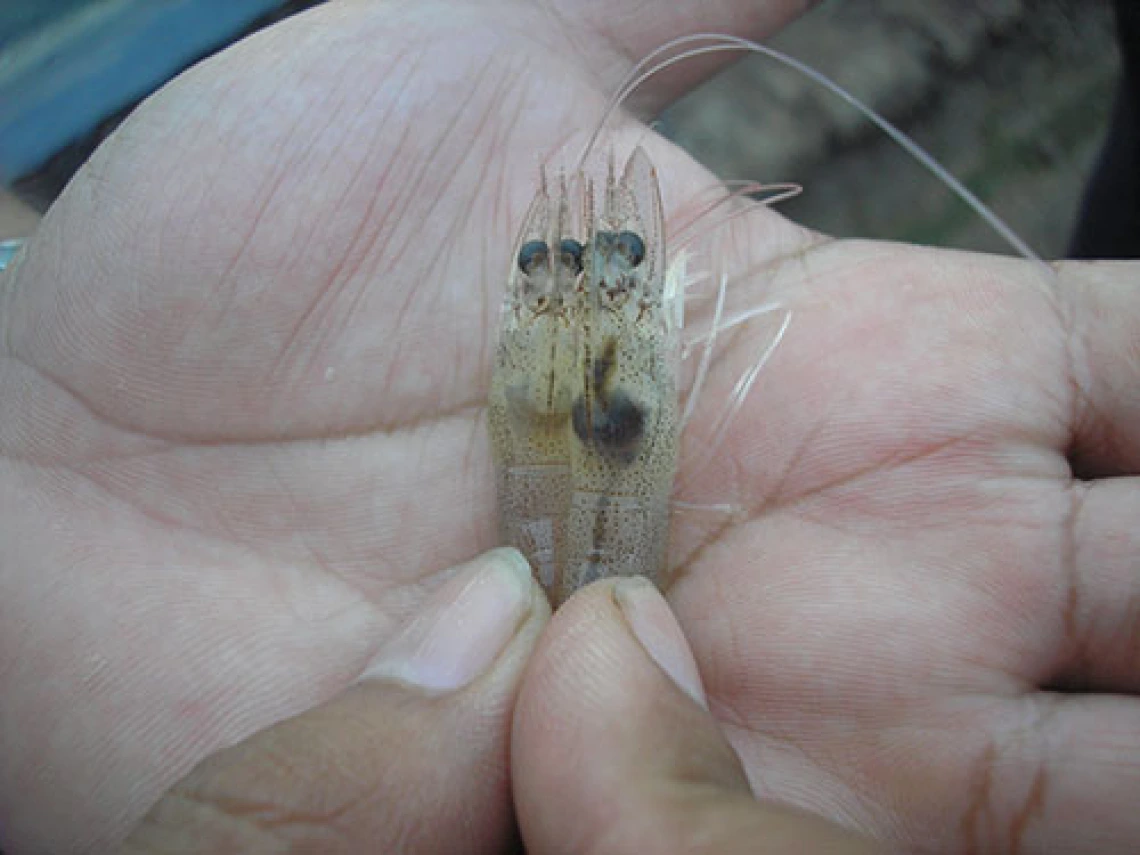Solution for Early Shrimp Death On the Way

University of Arizona Solution for Shrimp Early Mortality Syndrome to Become Available Worldwide
Tucson, Arizona – A bacterial disease called early mortality syndrome is killing off the stocks of the world’s three largest shrimp producers: Thailand, China and Vietnam. In some places, production is down by nearly 50 percent from last year. But there is hope. At the University of Arizona, Professor Don Lightner in the School of Animal and Comparative Biomedical Sciences, has a solution for detecting the bacteria in the stocks, allowing infected populations to be separated from healthy ones.
Lightner and Assistant Staff Scientist Linda Nunan have created a rapid diagnostic test capable of detecting the genetic differences between the pathogenic and non-pathogenic versions of the common marine bacterium, Vibrio parahaemolyuticus, which causes the disease. This method will enable specific detection of affected shrimp, currently only identified through the use of histology, which is time consuming and expensive. A rapid polymerase chain reaction (PCR) test for the detection of this pathogen will be the first on the market and is critically needed by the shrimp producing industry.
To get the solution into the hands of shrimp farmers, Lightner connected with Tech Launch Arizona (TLA), the University of Arizona’s technology commercialization office. Through TLA’s processes, the UA entered into a licensing agreement with GeneReach Biotechnology Corporation to commercialize the solution and make it available worldwide.
“The goal from the beginning has been to clearly define the solution and then partner with a company with the resources to produce and distribute the diagnostic.” says Doug Hockstad, Director of Tech Transfer Arizona, the Tech Launch Arizona unit charged with helping faculty members move their innovations from the lab bench out into the marketplace.
“In commercializing this technology, we’re creating the pathways to get it out to the people who need it as quickly and efficiently as possible,” says Hockstad.
Grace Chang, CEO of GeneReach, had this to say about the project: “Working with Dr. Lightner and the TLA team has been a pleasant experience. The team has been very professional, thorough, and well-organized. We all share a common goal: to transfer and translate Dr. Lightner’s technology into diagnostic products to help the shrimp farming industry promptly. We are pleased to obtain the Agreement, and expect to launch the products in early 2014.”
Lightner is equally ready to bring the solution to the world as soon as possible.
“Developing the diagnostic has been a complex process,” he says, “but now that we’ve got that done, I’m just delighted that we have a clearly defined way to get it out to the world to help solve the problem.”
About Tech Launch Arizona
The UA created Tech Launch Arizona to advance University discoveries into intellectual property, inventions and technology. TLA represents a prioritization, restructuring and resource enhancement of the UA’s technology commercialization and industry-sponsored research efforts. TLA moves knowledge and inventions developed by students and faculty into the market, with the primary goal of unifying UA researchers and the business community to significantly enhance the impact of university research, technological innovation, and technology park assets. By 2020, the UA through Tech Launch Arizona aims to become a recognized national resource for its role in integrating UA-created knowledge into tangible economic and social benefit.
About GeneReach
GeneReach Biotechnology Corporation, headquartered in Taiwan, is dedicated to bringing the innovation to point-of-need applications. By developing, manufacturing and marketing products based on applied nucleic acid detection technology, GeneReach offers reliable, affordable, and easy to use pathogen detection platforms, including equipments and reagents, to multiple industries. The products are currently for aquaculture, biosecurity, companion animal and livestock industries, manufacturing in compliance with the requirements of Good Manufacturing Practices (GMP) in addition to ISO 9001:3008 and ISO 13485:2003.

